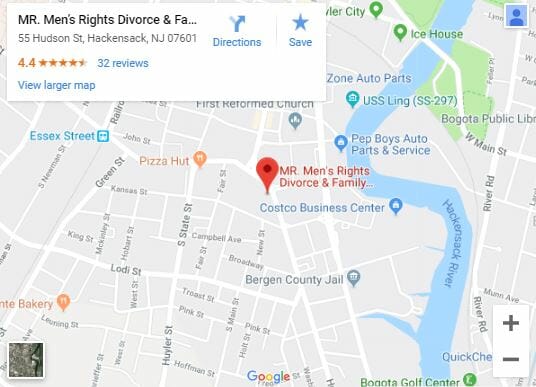
Proper Paperwork for Filing for Divorce in NJ
When filing for a divorce, the paperwork can be a challenge. For example, what documents are needed to file for divorce in NJ? It can take a lot of work to keep track of, as can knowing what purpose they serve and who they should be sent to.
The Legal Services of New Jersey (LSNJ) self-help guide and other publicly available information can help. However, when you want the work to be done right, our experienced attorneys at [MFR] Men’s & Fathers’ Rights Divorce Lawyers can help.
With our assistance, you can avoid common errors and save time by not having to fix and resubmit documents to the court.
When is Filing for Divorce Allowed in New Jersey?
In New Jersey, if you are 18 or older, married, and a state resident, you can file for a divorce from your spouse.
Where you file for divorce is important; you can file in the county where you live, where your spouse lives if separated, or, in some cases, file with the state instead of filing with the county.
Tip: There are reasons when choosing a location, so always speak with an attorney.
New Jersey Divorce Forms
The forms you will need to file with the court include:
- The Complaint for Divorce: This states the grounds for the divorce. You can cite various reasons for divorce in your complaint, such as no-fault and at-fault divorce. A no-fault divorce is based on irreconcilable differences between you and your spouse. An at-fault divorce bases the divorce request on grounds such as separation of at least 18 months, adultery, extreme degrees of cruelty, one spouse being incarcerated, and other such causes.
- The Certification of Verification and Non-Collusion: This form states that you’re filing your divorce complaint in good faith; there are no further pending proceedings; and all reported information is true to your knowledge. Note that if you have other pending proceedings related to your marriage, these must be disclosed.
- The Summons and Proof of Service: This informs your spouse that a formal request has been filed, and divorce proceedings have begun.
- The Certification of Insurance Coverage: This list provides any active insurance policies you have during your divorce, such as auto, renters, life, and others. Information can be provided later if unavailable at the time of filing. If you need to research your policies or provide further clarifying information, you can provide it to your attorney once you have it.
- The Certification of Notification of Complementary Dispute Resolution Alternatives: For this document, the process is to read it, fill it out, and sign it. This form will then be sent to your spouse with all other documents.
- The Family Part Case Information Statement: In cases involving child custody, child support, alimony, or equitable distribution of assets, this form will be required but does not need to be filed at the same time as your divorce complaint. This document goes over finances and income in great detail.
- The Confidential Litigant Information Sheet: This confidential document contains personal information such as children’s birthdays, social security numbers, medical information, and other private information. This is not to be mailed to your spouse and is used only by the court.
- The Request for Waiver of Fees: You can request a waiver of fees if your income is at or below 150 percent of the current poverty level based on household size and you have no more than $2,500 in your bank account. This is a hard waiver to receive but worth considering if you meet the criteria.
- The Filing Letter to Court: This document is a cover letter when sending all other forms. Like other documentation, be sure to keep a copy for your records.
Serving Summons
Service of summons can be done by professional process servers or the local county sheriff. Once this is done, proof is provided that you will then submit to the court verifying that your spouse has received the divorce documents.
Summons can also be sent by mail and signed by the recipient when the Complaint for Divorce and Summons is received. If your spouse has hired an attorney, and you are aware of this fact, you will need to serve the attorney directly and not your spouse.
Divorce documents can be mailed via regular or certified mail; however, a return receipt is needed to verify that the documentation has been received by your spouse or their legal representative.
You may encounter a situation where you cannot serve your spouse and providing the documents through the sheriff’s office or by mail is not a viable option. If you are having difficulties successfully serving your spouse, an attorney can help as other options can be used in these situations. The best choice will depend on your unique circumstances.
Other Forms
Filing the initial forms is only the first step in the divorce process. Future form filing requirements depend on how your spouse responds to the divorce request. This can include your spouse’s filing a Complaint for Divorce, filing an Answer and Counterclaim for Divorce, or not responding at all. After all of this, both you and your spouse will need to complete and file a Financial Case Information Statement. This document is submitted under oath and you want to be super careful to disclose what is required but not overshare what is not needed. If you have unreported income or any other unique financial circumstance that you are hesitant to disclose, you want to speak with an attorney to figure out the best way to explain the situation to avoid inadvertently getting yourself into trouble.
Any documentation sent in response to your divorce request must be answered; however, if there is no response, you can proceed with a default divorce or receive a default judgment. With [MFR], you are prepared no matter the outcome.
We are Here to Help You
A divorce can be a stressful time in your life and [MFR] is here to help you through the process and help remove the guesswork.
We help you deal with the various paperwork and legal requirements to ensure your divorce filing proceeds as efficiently as possible.
Call us at (201) 880-9770 or fill out our convenient online form to contact us. With our assistance, you don’t have to worry about being prepared.

